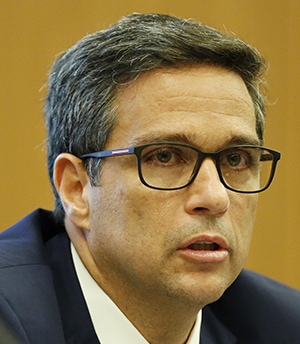Roberto Campos Neto, president of the Central Bank of Brazil, on the economic prospects for his country and the region, and how reforms are helping mitigate risk.

Global Finance: Brazil had GDP expanding just above 1% in 2017 and 2018. What is your view on the economy for the remainder of this year and next?
Roberto Campos Neto: Recent data on economic activity suggests a possible resumption of the process of economic recovery, which had been interrupted in recent quarters. We estimate that GDP must remain stable or show a small increase in the second quarter, with some acceleration expected for subsequent quarters, which will likely be reinforced by the stimuli provided by the release of [funds for unemployment insurance and other benefits guaranteed to workers]. Notwithstanding this expected acceleration, the baseline inflation scenario assumes that the underlying pace of economic growth—excluding the effects of temporary stimuli—will be gradual.
The persistence of uncertainties regarding fiscal sustainability tends to be contractionary. In particular, these uncertainties affect irreversible investment decisions, and therefore require greater predictability of future scenarios.
In a context of limited fiscal space for public investment, it is important to continue the process of reforms and adjustments that contribute to the sustainability of fiscal policy. By reducing fundamental uncertainties about the Brazilian economy, these reforms tend to stimulate private investment. This potential expansionary effect should, to some extent, offset the impact of current fiscal adjustments on economic activity, and mitigate the risk of episodes of large risk premium increases, as witnessed in 2018.
Our understanding is that an acceleration of the pace of economic recovery to more-robust levels will also depend on other initiatives aimed at productivity increases, efficiency gains, greater flexibility of the economy and improvements in the business environment. These efforts are fundamental for the resumption of economic activity and development of the Brazilian economy. Initiatives in the structural agenda of the Banco Central do Brasil—called the BC# Agenda, formerly BC+ Agenda—contribute to this process.
GF: What is your view of the economic outlook for the region this year and next?
Campos Neto: In general terms, growth projections for Latin American countries have been revised downward. The global economy’s cyclical slowdown, the deceleration of the Chinese economy and the escalation of trade tensions are the main culprits. The global slowdown harms external demand and consequently reduces exports—not only by reducing volumes, but also, due to lower commodity prices, by its major impacts on commodity exporters like Chile and Peru. Private investors have been careful about some countries, like Mexico, in light of US threats to increase import tariffs and recurrent losses of Pemex [Petróleos Mexicanos, the state-owned oil company]. Argentina has been also under market scrutiny, regarding the challenges posed by the stabilization of the economy and the electoral cycle.
In response to global challenges, there has been a shift toward more accommodative monetary policy in major central banks, which makes room for more accommodative policy in emerging markets as well. Chile, Peru and Brazil have cut interest rates recently, with well-anchored inflation expectations and floating exchange rates. Mexico and Colombia still have inflationary pressures, but may ease soon. In Brazil, monetary-policy easing goes side by side with the reform agenda, paving the way for a cyclical recovery.
GF: What keeps you up at night? What are the major economic risks?
Campos Neto: We have been highlighting in our communications that our baseline scenario for inflation encompasses risk factors in both directions. On the one hand, the high level of economic slack may continue to produce lower-than-expected inflation trajectory. On the other hand, a possible frustration of expectations regarding the continuation of reforms and necessary adjustments in the Brazilian economy may affect risk premia and increase the path for inflation over the relevant horizon for the conduct of monetary policy. This risk intensifies in case of reversal of the benign outlook for emerging economies.
Our view is that the balance of risks has improved recently. In particular, it is worth mentioning the concrete progress made in instituting reforms required by the Brazilian economy, adjustments that are fundamental for maintaining a benign environment for inflation with anchored expectations. In any case, the risk of frustrated expectations regarding the continuation of reforms in the Brazilian economy is still the main factor in its balance of risks.



